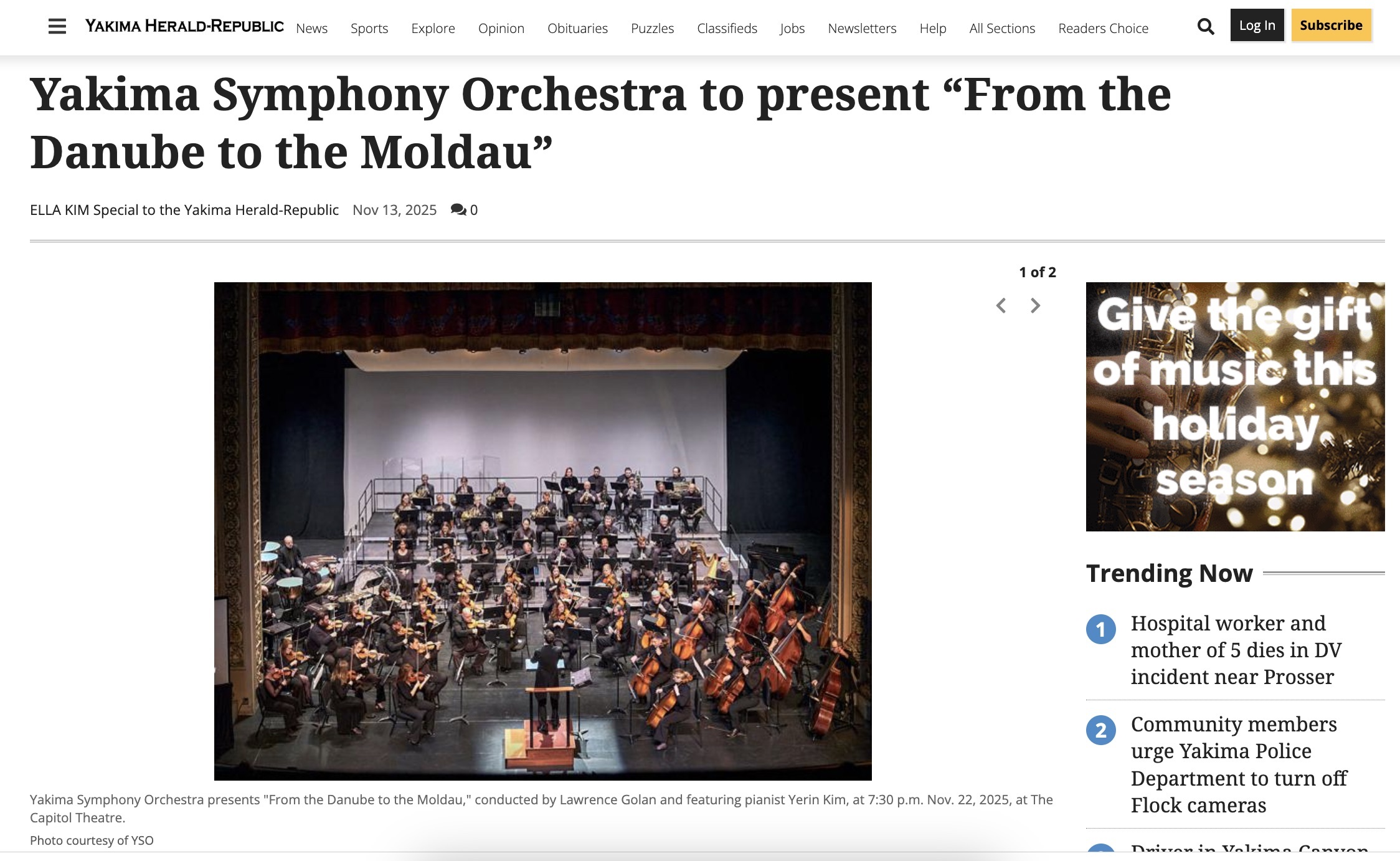Yakima Herald Explore - The Sound of Water


Rivers have long served as symbols of life, movement, and transformation. They carve through landscapes, nurture communities, and carry stories from one shore to another. The Yakima Symphony Orchestra invites audiences to embark on a symphonic voyage that follows the currents of these ever-flowing waters.
On Saturday, November 22 at the Capitol Theatre, the Yakima Symphony Orchestra presents From the Danube to the Moldau, a program that explores the power and poetry of flowing water through four very different musical voices that have turned watery influence into sound and story: Johann Strauss Jr.’s On the Beautiful Blue Danube, Wolfgang Amadeus Mozart’s Piano Concerto No. 20 in D minor, Duke Ellington’s The River, and Bedřich Smetana’s The Moldau.
Strauss’s On the Beautiful Blue Danube is more than just the world’s most famous waltz tune. Written in 1866 as a commission to lift the spirits of war-torn Austria, this work has since become a global symbol of grace and celebration. Iconically, the piece appeared in Stanley Kubrick’s film 2001: A Space Odyssey. Its opening measures shimmer like sunlight glinting on the surface of the Danube, before giving way to five flowing waltzes that dance with effortless charm. The Danube River floats through Vienna, where the next piece on our program was composed.
Mozart’s Piano Concerto No. 20 takes us to a different current and century altogether. This major piece of work was composed and premiered in Vienna in 1785, with Mozart himself at the piano. The music begins in shadow—a dark, restless undercurrent runs through the first movement, ending quietly without resolution. Our piano soloist Yerin Kim says, “While most of Mozart’s music is written in a major key, this piece is in D Minor, and instantly the tone and temperature are quite different.” The second movement is more peaceful and lyrical—as Kim describes, “deeply personal, like I am writing into a diary.” The third and final movement is brisk and revisits the themes of the opening of the piece. The piano and the orchestra restlessly trade ideas back-and-forth until the virtuosic piano solo cadenzas brighten the mood and the piece ends in jubilation. Yerin Kim will perform Beethoven’s cadenzas for this movement in her performance with the Yakima Symphony Orchestra.
Crossing the Atlantic and two centuries, Duke Ellington’s ballet suite The River showcases a distinctly American voice. Written in 1970 for the American Ballet Theater’s 30th anniversary, the work traces the metaphorical journey of a human life—from a trickling spring to the vast sea beyond, or rather, from birth to death. Through a series of movements with titles like “Spring,” “Giggling Rapids,” and “The Falls,” Ellington paints life’s stages with jazz harmonies, rhythmic swells, and moments of soulful reflection. The river in Ellington’s hands becomes a symbol of renewal; its course is winding and unpredictable, but ultimately expansive and free.
The program concludes with Bedřich Smetana’s The Moldau, a beloved symphonic poem from the 19th century, just one out of six Smetana composed that depicted some aspect of the countryside, history, or legends of Bohemia. Inspired by the Moldau River that flows through Smetana’s native Bohemia, the piece traces its journey from two small springs through forests, meadows, villages, and the city of Prague before joining the Elbe. Along the way, listeners hear musical depictions of a peasant wedding, a moonlit dance of water nymphs, and proud silhouettes of castles. The Moldau is both a national portrait and a deeply personal expression of love for the composer’s homeland.
Taken together, these works remind us that water and music share the same essence: both are in constant motion, shaping and influencing everything they touch, with the fluidity to carry deeply personal expressions. Whether through the elegant pulse of Strauss’s waltz, the emotional tides of Mozart’s concerto, the spiritual reflections of Ellington’s ballet, or the sweeping landscapes of Smetana’s Bohemia, the river’s voice endures.
Here in Yakima, where our own rivers weave through orchards and valleys, this program feels especially close to home. It invites us to listen not just with our ears, but with a sense of connection—to the music, to one another, and to the living currents that sustain us all.
Tickets at YSOmusic.org. For more information, call 509.248.1414.
—Ella Kim